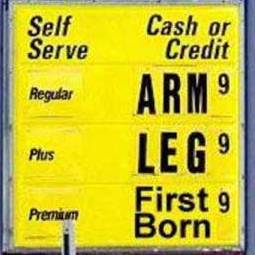by David Howden

David Howden
Most people — from young to old and from all ends of the political spectrum — are united by a common bond. The idea that banks are deserving of taxpayer support is viewed as morally repugnant to them. Business owners see bank bailouts as an unfair advantage that is not extended to all businesses. Those typically on the political left see it as support for the establishment, and a slap in the faces of the little people. Those more at home on the political right see it as just another form of welfare: a wealth redistribution from the hard working segment of the population to the reckless gambling class of banksters.
Despite this common disdain for bankers, there is considerable disagreement on how to deal with them. One group sees less regulation as the solution — letting market forces work will allow the virtues of prudence and industry to prevail. This formulation sees these same market forces as limiting firm size naturally to evade the “too big to fail” issue, through many of the same incentives that foment competitive economic advancement.
Another group sees the solution as more regulation. The natural tendency in business, according to this group, is for large monopolies to form. As companies grow in size, they gain political influence as well as an aura of indispensability. The consequence is that not only will a company come to be seen as too big to fail, but it will also be politically influential enough to seek such recourse if troubles surface.
Like most answers, the truth lies somewhere in the middle.
 The first group correctly notes that there are two specific drawbacks of increasing regulation. On the one hand, “one size fits all” regulatory policies (such as is commonly the case on the Federal level) are rarely capable of handling the intricacies and dynamics of business. They also have the effect of relaxing the attention individuals and businesses afford to their own behavior. Under the pretense that the state has enacted wise regulations, individuals see little need to actively monitor companies to make sure they behave in a responsible manner. Businesses too succumb to this mentality. By abiding by the existing regulatory regime, they take solace in knowing that any attack on their integrity can be brushed aside as an attack placed more appropriately on the failures of the regulating body.
The first group correctly notes that there are two specific drawbacks of increasing regulation. On the one hand, “one size fits all” regulatory policies (such as is commonly the case on the Federal level) are rarely capable of handling the intricacies and dynamics of business. They also have the effect of relaxing the attention individuals and businesses afford to their own behavior. Under the pretense that the state has enacted wise regulations, individuals see little need to actively monitor companies to make sure they behave in a responsible manner. Businesses too succumb to this mentality. By abiding by the existing regulatory regime, they take solace in knowing that any attack on their integrity can be brushed aside as an attack placed more appropriately on the failures of the regulating body.
On the other hand, increased regulation breeds the problem of what economists call “moral hazard.” An activity is morally hazardous when a party can reap the benefits of an action without incurring the costs. The financial industry is very obviously afflicted with moral hazard today.
Banks and other financial companies have largely abided by the law. I would venture a guess that there is no industry more heavily regulated than the financial services industry, and no industry that spends more time and resources making sure that it complies with this complex regulatory maze. Capital levels must be maintained, reporting must be prompt and transparent, and certain types of assets must be bought or not bought. Banks following these regulations are get a sense that they will survive, if not flourish, provided they work within the confines of the law.
However, it is increasingly evident that the financial regulations put in place over the past decades are woefully inept at maintaining a healthy financial industry. In spite of (or perhaps because of) all these regulations, a great many companies are, shall we say, less than solvent. So, who is to blame? It would be easy to blame the companies themselves, except that they did everything that the regulators told them to do.
Why not at least consider relaxing regulations? Doing so would have a two-fold advantage.
On the one hand, businesses would be more obviously responsible for the instability they have now created. On the other hand, without regulations, more reckless or clumsily managed companies would have gone out of business already, lacking the benefit of a regulatory “parent” scolding them for their mistakes. The result would be fewer unstable businesses, and more attention to the dangers of one’s own actions.
I previously mentioned that both sides are correct to some degree, implying that those calling for more regulation had some merit to their arguments. And this is indeed true. However, to paraphrase Inigo Montoya, when they use the word “regulation,” I do not think it means what they think it means.
It is true that not all companies play on a level field. In the financial services industry, and particularly in the banking sector, this is especially apparent. Banks are granted a legal privilege of “fractional reserves.” The result is that banks behave in a way which is fundamentally different from any other type of business, and which is easy to misdiagnose as “inadequate regulation.”
A depositor places money in his bank. The result is a deposit, and the depositor has a claim to this sum of money at any moment. One would think that the bank would be obliged to keep the money on hand, much in the same way that other deposited goods — like grain in an elevator — must be kept on hand. The law begs to differ. Banks are obliged to keep only a portion, or fraction, of that deposit in their vaults and are free to use the remaining sum as they please. Canada and the United Kingdom are examples of countries where there is no legal requirement for a bank to hold any percentage of that original deposit in its vault. In the United States, if a bank has net transactions accounts (deposits and accounts receivable) of less than $12.4 million, the reserve ratio is also set at zero. This differs greatly from grain elevators, where the law strictly states that the elevator owner must keep 100 percent of the deposited grain in the silo.
There are two results of the practice of fractional reserve banking, neither of them positive for the average person.
First, banks grow larger because they have access to a funding source that would otherwise not be available if they conducted themselves by the same laws as other businesses. When commentators say “banks are different,” there is truth in the statement. They have a legal privilege that enables them to grow in scope beyond that which they could naturally. This also explains why many banks, and financial services companies, come to be viewed as too big to fail.
Second, banks become riskier. Every time a deposit is not backed 100 percent, the depositor is exposed to the possibility of not getting his deposit back in full. If a bank uses his deposit to fund a mortgage, and the borrower defaults and cannot repay the bank, there is a risk that the original depositor will lose some of his money. A more common case is a bank run, in which many depositors try to withdraw money at the same time. The result will be insufficient funds to simultaneously honor all redemption demands. This occurred with various banks in Iceland, Ireland, Britain, and Cyprus over the last four years.
Few people worry about this latter problem, however, because of the former one. Since banks have become too big to fail, we are assured that if one goes bankrupt, we as depositors do not stand to lose personally. The government has pledged implicitly, or even explicitly through deposit insurance, that it will step in and bail out the irresponsible actors.
The result is the confusing state of affairs that we have today with two sides both arguing for the same thing — banking stability — via two diametrically opposed means. The “more regulation” camp is pitted against the “less regulation” camp.
A Solution
These two camps are not mutually exclusive. We can solve the problems of moral hazard and “too big to fail” in one fell swoop by ending fractional reserve banking.
By ending this legal privilege, we eliminate the ability for banks to grow to such inordinate sizes. By abiding by the same legal principles (or “regulations,” if you will) as any other deposit-taking firm, banks are not unduly advantaged. If banks shrink in size, the “too big to fail” doctrine is eliminated, or at least greatly reduced. This means that depositors and bankers will realize that if a loss occurs to their bank, they personally stand to lose.
The risk of loss is a great force in removing moral hazard. Remember that it only arises when one person’s ability to gain is not constrained by the threat of a loss. Cognizant of ensuing losses, depositors will demand that their banks adhere to more prudent operating principles, and bankers will be forced to meet these demands.
The critics worried about “too big to fail” are right. We do need more “regulations,” in a sense. We need banks to be regulated by the same legal principles regarding fraud as every other business. The critics worried about moral hazard are also right. We need fewer of every other kind of regulation.
Repairing a broken financial system does not have to be hampered by irreconcilable political differences. Recognizing the true issues at stake — legal privilege and unconstrained risk taking — allows one to bring together advocates of widely differing solutions into one coherent group. Getting bankers to agree to all this is another story.
 In this under four minute video Godfrey Bloom, member of the European Parliament for Yorkshire and North Lincolnshire, explains the obvious–that the euro was doomed from the start and those who advocated it knew that it could not succeed without a centralized fiscal policy, meaning a centralized European government. From the very beginning of what is now the EU, with the establishment of the European Coal and Steel Community in the early 1950’s, there were explicit calls for the a centralized European government and an end to national governments. The problem is that few people in Europe, outside of a political elite who would benefit via jobs and perks, actually want a centralized European government. That is why there are so few referendums and, when the people are asked about joining a centralized European state, the answer always is NO.
In this under four minute video Godfrey Bloom, member of the European Parliament for Yorkshire and North Lincolnshire, explains the obvious–that the euro was doomed from the start and those who advocated it knew that it could not succeed without a centralized fiscal policy, meaning a centralized European government. From the very beginning of what is now the EU, with the establishment of the European Coal and Steel Community in the early 1950’s, there were explicit calls for the a centralized European government and an end to national governments. The problem is that few people in Europe, outside of a political elite who would benefit via jobs and perks, actually want a centralized European government. That is why there are so few referendums and, when the people are asked about joining a centralized European state, the answer always is NO.













